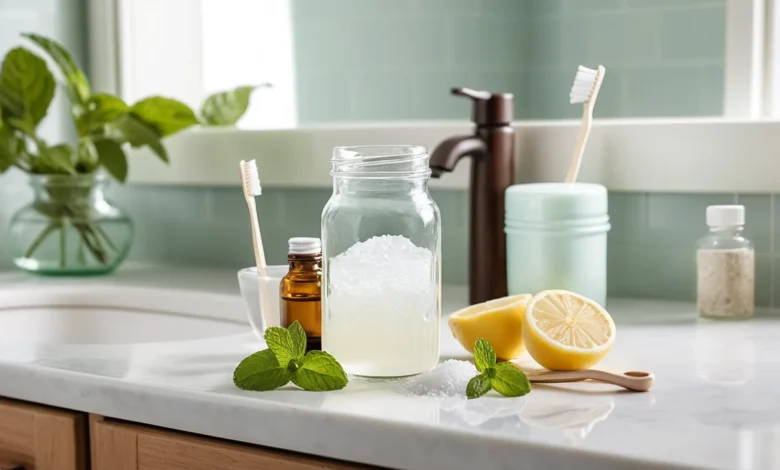Simple Home Remedies for Fresh Breath and Oral Health

Maintaining fresh breath and good oral health is essential for overall well-being. Bad breath, or halitosis, can affect your confidence and social interactions, while neglecting oral hygiene can lead to serious dental issues. Fortunately, there are numerous simple home remedies that can help you achieve fresh breath and promote oral health naturally. In this article, we’ll explore effective remedies, answer common questions, and provide actionable tips to help you smile with confidence.
Understanding Oral Health and Bad Breath
Oral health encompasses more than just a beautiful smile; it involves the condition of your teeth, gums, and mouth. Bad breath can result from various factors, including poor oral hygiene, certain foods, dry mouth, and medical conditions. By adopting a consistent oral care routine and utilizing natural remedies, you can combat bad breath and enhance your overall oral health.
1. Baking Soda for Fresh Breath
Baking soda is a powerful natural remedy for freshening breath. It helps neutralize acids in the mouth and eliminates odor-causing bacteria.
- How to Use: Create a paste by mixing baking soda with water and use it as a toothpaste. Brush your teeth with this mixture a few times a week for optimal results.
2. Apple Cider Vinegar for Mouth Rinse
Apple cider vinegar (ACV) has antibacterial properties that can help reduce bad breath by killing harmful bacteria in the mouth. Its acidity also helps balance the pH levels in your mouth.
- How to Use: Mix one tablespoon of ACV with a glass of water and use it as a mouth rinse. Rinse for about 30 seconds, then spit it out. This can be done daily for effective results.
3. Green Tea for Antioxidant Boost
Green tea is rich in antioxidants and has antibacterial properties that can help reduce bad breath. The polyphenols in green tea inhibit the growth of bacteria and neutralize odors.
- How to Use: Brew a cup of green tea and sip it throughout the day. Alternatively, you can use green tea as a mouth rinse for added benefits.
4. Coconut Oil for Oil Pulling
Oil pulling is an ancient practice that involves swishing oil in your mouth to remove bacteria and promote oral health. Coconut oil is particularly effective due to its antimicrobial properties.
- How to Use: Take a tablespoon of coconut oil and swish it around your mouth for 10–20 minutes, then spit it out. Rinse with warm water and brush your teeth afterward. This can be done several times a week.
5. Salt Water Rinse for Gum Health
A salt water rinse can help soothe irritated gums and kill bacteria that cause bad breath. It also promotes healing and reduces inflammation.
- How to Use: Dissolve half a teaspoon of salt in a glass of warm water. Rinse your mouth with this solution for 30 seconds, then spit it out. Repeat this daily or as needed.
6. Herbal Remedies with Mint and Parsley
Mint and parsley are natural breath fresheners that can help combat bad breath. They contain chlorophyll, which neutralizes odors and promotes oral health.
- How to Use: Chew fresh mint leaves or parsley after meals for a refreshing breath. You can also brew mint or parsley tea for additional benefits.
7. Clove for Antimicrobial Action
Cloves have strong antimicrobial properties that can help eliminate bacteria in the mouth and provide relief from bad breath.
- How to Use: Chew on a few whole cloves or use clove oil diluted with a carrier oil as a mouth rinse. This can be done a few times a week for effective results.
8. Water for Hydration
Staying hydrated is essential for maintaining fresh breath. A dry mouth can lead to bad breath, as saliva helps wash away food particles and bacteria.
- How to Use: Drink plenty of water throughout the day to stay hydrated. Additionally, consider drinking water after meals to rinse away food particles.
Frequently Asked Questions About Oral Health and Fresh Breath
Q: How often should I brush my teeth for optimal oral health?
A: It is recommended to brush your teeth at least twice a day, ideally after meals, and to floss daily to remove food particles and plaque between teeth.
Q: Can certain foods cause bad breath?
A: Yes, foods such as garlic, onions, and certain spices can contribute to bad breath due to their strong odors. Proper oral hygiene can help minimize their effects.
Q: Is it normal to have occasional bad breath?
A: Yes, it’s normal to have bad breath from time to time, especially after eating certain foods. However, persistent bad breath may indicate an underlying health issue.
Q: Can I rely solely on home remedies for oral health?
A: While home remedies can be effective, it’s essential to maintain regular dental check-ups and professional cleanings for optimal oral health.
Q: Are there any signs of poor oral health I should watch for?
A: Signs of poor oral health include persistent bad breath, swollen or bleeding gums, tooth sensitivity, and pain while chewing. If you experience these symptoms, consult a dentist.
Conclusion: Embrace Natural Remedies for Fresh Breath and Oral Health
Achieving fresh breath and maintaining good oral health is essential for confidence and well-being. By incorporating these simple home remedies into your daily routine, you can effectively combat bad breath and promote overall oral hygiene. Remember that a consistent oral care regimen, including brushing, flossing, and regular dental visits, is crucial for long-term oral health. Embrace the power of nature and enjoy a fresh, healthy smile!





